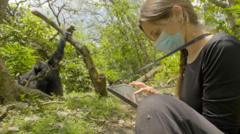In a fascinating display of knowledge and empathy, wild chimpanzees in Uganda have been filmed employing medicinal plants to treat injuries. University of Oxford researchers, alongside local teams at Budongo Forest, documented these instances where chimpanzees engaged in 'forest first aid,' utilizing flora both for self-care and care of others. This research builds upon last year's findings that chimpanzees actively select specific plants for self-medication.
The study, published by the journal *Frontiers in Ecology and Evolution,* details how these primates possess a varied behavioral arsenal when faced with ailments, ensuring their health in the wild. "Chimpanzees exhibit an impressive variety of behaviors when injured," explained lead researcher Elodie Freymann. They utilize accessible plants by applying them directly onto wounds or chewing them to create healing pastes for injuries.
Among the compelling footage collected, a young female chimpanzee was seen tending to an injury on her mother's body, which is significant as it also indicates deep-rooted empathy among the species. Dr. Freymann noted that observations from the Budongo Forest field station, dating back to the 1990s, documented behaviors such as leaf-dabbing to treat injuries and assisting other chimpanzees with removing snares from their limbs.
In addition to their empathetic behaviors, the research team had previously identified certain plants sought after by injured chimpanzees and conducted tests that revealed these plants often exhibit antibacterial properties. The researchers argue this knowledge is crucial, potentially paving the way for further discoveries in plant-based medicines through their study of chimpanzee behavior.
Further studies have indicated that other non-human apes like orangutans also possess an understanding of plant-based medicine. Dr. Freymann points out the stark contrast between the survival skills of chimps and human limitations in natural environments, emphasizing the profound connection these animals have with their habitat. "Chimpanzees thrive here because they know how to access the secrets of this place," she stated, illustrating their innate ability to survive using their surroundings.
The study, published by the journal *Frontiers in Ecology and Evolution,* details how these primates possess a varied behavioral arsenal when faced with ailments, ensuring their health in the wild. "Chimpanzees exhibit an impressive variety of behaviors when injured," explained lead researcher Elodie Freymann. They utilize accessible plants by applying them directly onto wounds or chewing them to create healing pastes for injuries.
Among the compelling footage collected, a young female chimpanzee was seen tending to an injury on her mother's body, which is significant as it also indicates deep-rooted empathy among the species. Dr. Freymann noted that observations from the Budongo Forest field station, dating back to the 1990s, documented behaviors such as leaf-dabbing to treat injuries and assisting other chimpanzees with removing snares from their limbs.
In addition to their empathetic behaviors, the research team had previously identified certain plants sought after by injured chimpanzees and conducted tests that revealed these plants often exhibit antibacterial properties. The researchers argue this knowledge is crucial, potentially paving the way for further discoveries in plant-based medicines through their study of chimpanzee behavior.
Further studies have indicated that other non-human apes like orangutans also possess an understanding of plant-based medicine. Dr. Freymann points out the stark contrast between the survival skills of chimps and human limitations in natural environments, emphasizing the profound connection these animals have with their habitat. "Chimpanzees thrive here because they know how to access the secrets of this place," she stated, illustrating their innate ability to survive using their surroundings.



















